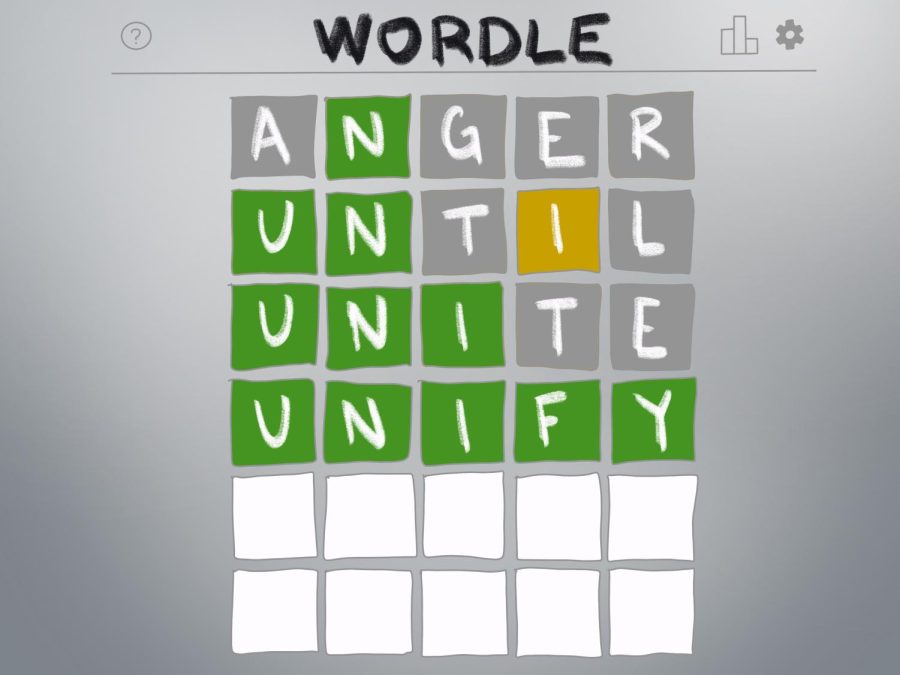Opinion: Unity is what makes Wordle special
The viral daily word game slows us down and brings us together. That force for unification should be more appreciated.
Wordle is the latest word puzzle game to go viral on social media. It was acquired by The New York Times Company last week. (Staff Illustration by Manasa Gudavalli)
February 9, 2022
My roommate and I often find ourselves awake at midnight — we’re college students with heavy workloads and a healthy amount of insomnia. Midnight symbolizes a new day, a satisfying tick of the clock. But for us, it also means we’ll have six attempts to guess a five-letter word. We work silently on that day’s Wordle, with the casual “ugh” or “fuck” when choosing the right word is just a bit too overwhelming. After I eventually get the answer, whether it be in the typical four tries, the heart attack-inducing six, or the very rare and lucky two (I’ve received this honor once), my mom receives a text with green, yellow and black emojis. She’s on the West Coast, so her word won’t be out for three more hours, and, knowing my mother, she’ll be asleep way before her clock strikes midnight.
The goal of Wordle, which can only be played once a day, is to guess that day’s five-letter word. It has the 2017-era hype of HQ Trivia with less pizazz and lower stakes, The New York Times Crossword with less elitism — it’s the perfect unifier.
There’s something different about having one right answer once a day. Those five letters will mean nothing in 24 hours, but today they are the most important thing to know. They are the subject of texts, of small talk, of efforts in procrastination. Frustratingly, the puzzle can only be done once. All you want to do is give the game another go, to prove that you can solve another word faster. You won’t get that chance for another day. And while I do confess to playing the Wordle archive when nothing sounds more appealing than a grid of letters, it is simply not the same. Some even tamper with the date settings on their phone so they can access future Wordle games. However, the game’s beauty lies in its opposition to our current culture. It is the unifier in our polarized world, the activity you have to wait for in the age of Amazon Prime and instant gratification.
In some ways, this hot new trend takes us back in time. It takes us back to the era where there weren’t 100 conflicting news channels and newspapers — the era where we all had the same new thing to discuss, when we weren’t so divided and competitive. Wordle’s charm is in its universal individuality. We are competing with our past selves to salvage a streak or to guess the word in fewer tries. Sure, we can compare with one another, but the competition all restarts in a day. It gives us a platform to strive to be better than we were yesterday. It takes a few seconds away from the curated blandness of Instagram or TikTok by showing everyone the same thing and giving everyone the same challenge. That is a beautiful thing.
The New York Times understood Wordle’s popularity — that’s why they bought it. As much as I love the Mini and the full Crossword — only Monday through Thursday, I’m not a genius — I don’t think Wordle needs to be Timesified. I don’t want to be able to connect with my friends on a leaderboard or compete for the best score with strangers, I just want to continue to challenge myself. I want the only statistics to be mine. I want to learn my friends’ daily scores by texting them mine and asking how they did. I want Wordle to be something that opens conversation, not closes it. I want Republicans to play without having to pay The New York Times to be involved. After all, I wouldn’t pay the New York Post a cent, even if it was to play my silly word game.
I would be naive to not understand that Wordle is a fad and, in a few weeks or months, something will come along to replace it. That’s what always happens. But for now, I’d like to savor the way that someone I’ve never met — with completely different beliefs and values — and I share the same five letters. I cannot think of anything so simply universal. Maybe for a while I’d like to be optimistic and dream of a world in which Wordle remains routine for years to come, where The New York Times decides that it should remain free forever. Maybe I’d like to think that Wordle’s existence proves we can unify and compromise over something, even in 2022.
I implore you to relish in the ease of having a conversation about Wordle. Compare your scores with someone you haven’t talked to in a while, or maybe the Sternie in the dorm room next to yours. Tell the uncle that gets his news on Facebook about Wordle — it’ll give you some common ground. Josh Wardle’s game is the next step toward a more unified world. We just have to remember that everyone is human, and every day everyone gets the same five-letter word.
Contact Alexandra Cohen at [email protected].





























































































































































